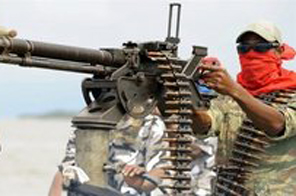Nigerian militants claim attack on Lagos oil jetty
LAGOS: Nigeria's main rebel group, which has targeted oil facilities in the south, claimed responsibility for a strike on an oil jetty in Lagos in its first attack in the country's economic heart.
"Heavily armed MEND fighters today, Sunday, July 12, 2009, at about 2230 hours (2130 GMT) carried out an unprecedented attack on the Atlas Cove Jetty," the Movement for the Emancipation of the Niger Delta said in a statement.
"The depot and loading tankers moored at the facility are currently on fire," it said of the facility, located in the Lagos harbour area.
Residents of the capital, including AFP correspondents heard a loud explosion reverberating across the bustling, sprawling city of around 16 million people.
Atlas Cove Jetty is the first point of contact for vessels as they enter Nigerian territorial waters from the west. Oil tankers are loaded here.
There was no immediate confirmation from police or government authorities.
The attack comes just hours before treason charges against a top MEND leader are expected to be dropped at a court hearing on Monday as part of a government amnesty deal offered to rebels.
Lawyers for MEND leader Henry Okah and top government officials agreed on the unscheduled hearing at a meeting Sunday, Okah's lawyer Femi Falana told AFP.
The release of Okah, incarcerated since September 2007 for gun-running and was facing treason charges, has been one of the rebels' main key demands.
Nigerian President Umaru Yar'Adua on June 25 declared an unconditional pardon for militants in the restive Niger Delta, if they "surrender their weapons and renounce militancy." The amnesty offer is vailed until October 4.
Violence in the southern region of the world's eight largest exporter of crude oil has cut output by more than 30 percent over the past three-and-a-half years.
Apart from attacks on oil installations and facilities in the Niger Delta, hundreds of oil workers -- foreign and local -- have been kidnapped in recent years. Most were freed unharmed after days, weeks or even months.
The rebels who launched an armed rebellion, or so-called "oil war" in the swamps and creeks of oil-rich southern Nigeria in 2006, say they will cripple the oil industry until locals get a more equitable share of the oil wealth.
The group adopted a pugnacious tone on Sunday, replete with Biblical references.
"The problems facing our dear country Nigeria has nothing to do with militant freedom fighters but with the corrupt political leadership," it said.
"The two-pronged approach of combining dialogue and intensifying attacks throughout the course of negotiations, will be the unique characteristics of Moses," MEND said, referring to its Lagos attack, which it calls 'Hurricane Moses.'
"We want to assure our people and well wishers that we will not sell our birthright for a bowl of porridge," it said.
"The mother of all plagues will be used as a last resort if the Nigerian Pharaohs show stubbornness over reasoning ..." it said, without elaborating.
"We sincerely hope for the sake of avoiding a total calamity that Egypt (the Nigerian government) will nor harden its heart," it added.
The state-run Nigerian National Petroleum Corporation (NNPC) has painted a grim picture of the fallout of the violence, saying monthly oil revenue this year dropped to around one billion dollars from an average of 2.2 billion dollars in 2008.
Nigeria, Africa's most populous country, relies on oil for more than 90 percent of its export earnings, but its foreign exchange reserves have plummeted by about 10 billion dollars in six months to 43.19 billion dollars in early June.






